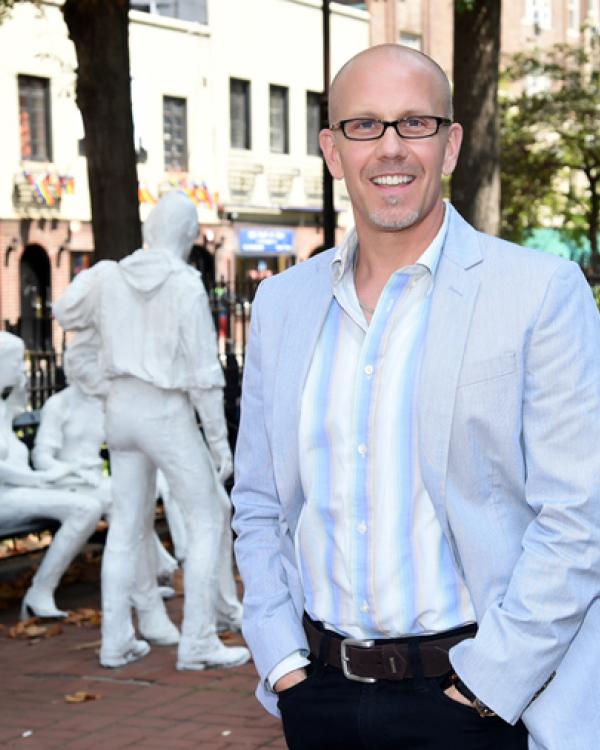
GGSE: You received one of the first LGBT social science Fulbright Awards. How did it feel to earn that honor?
Dr. Markus Bidell (CCSP, Ph.D., 2000; Bidell is currently an Associate Professor at Hunter College): Being awarded the 2014-2015 Regent’s University Fulbright Scholar Award brought home how far we have come regarding LGBT social science and public policy, but also how much work still remains. I think my generation of academics is likely the first that could be open and out as well as pursue LGBT scholarship. It wasn’t until 2003 that the U.S. Supreme Court in Lawrence v. Texas ruled that state sodomy laws were unconstitutional. Said another way, I had been an Assistant Professor for three years by the time the U.S. Supreme Court made this ruling. Certainly since I’ve graduated from UCSB in 2000, LGBT social science and Queer Studies have emerged as strong academic disciplines and fields of study on their own merits. When I started my graduate training, these areas were just beginning and many academics were concerned that engaging in LGBT social science research could have negative consequences because of societal prejudices and institutional discrimination.
GGSE: What research have you been doing in the UK for that Fulbright?
Bidell: As the 2014-2015 Regent’s University Fulbright Scholar, I am engaged in a teaching program and research project examining LGBT competency and training for mental health and medical providers in the United Kingdom. I am lecturing and speaking across the U.K. as well as the E.U. about LGBT mental health disparities and provider clinical competency. The aim of my research project is to collect data about U.K. LGBT clinical/counsellor competency as well as develop a new psychometric assessment that measures healthcare providers’ LGBT clinical competence.
GGSE: That research connects with your dissertation from UCSB? How did your time in the Ph.D. program in CCSP help prepare you for your career and the last 15 years?
My overall research agenda and my Fulbright research project are based on the emerging applied psychology construct of LGBT counselor/clinical competency. And this topic is directly connected to my doctoral studies at UCSB’s Department of Counseling, Clinical, and School Psychology. My time at UCSB was exceptionally positive. The one difficult experience I had when arriving, ended up shaping not only my dissertation, but also my future scholarship and professional work.
My efforts to operationalize LGBT affirmative counselor competency go back to a pivotal experience during my first doctoral course in career counseling at UCSB. The class was taught by a departmental professor with ardent beliefs that lesbian, gay, and bisexual sexual orientations were sinful and morally wrong. Furthermore, he promoted the use of conversion therapies, aimed at converting LGBT people to heterosexual and cisgender. All major U.S. and U.K. mental health and medical professional organizations now have strong position statements outlining such forms of treatment are not just unethical, but also highly damaging to clients and patients. For example in 2009, the American Psychological Association Council of Representatives adopted the “Appropriate Affirmative Response to Sexual Orientation Distress and Change Efforts” outlining opposition to such treatments and stating that conversion therapies, at their core, are based on historic social and moral prejudices about LGBT people.
For one assignment in this professor’s class, I needed to write a research paper on a topic and population of my choice, and mine focused on LGBT adolescent career development. After submitting the topic, the professor pulled me aside, outlined his religiously based disapprobation regarding LGBT individuals, rejected my proposal topic, and prohibited me from selecting any LGBT issues for the assignment. What I found most disquieting was witnessing how some students’ biased beliefs were bolstered by the professor’s declaration of his conservative religious views about LGBT issues. My concerns generated questions regarding the role of education and training for applied psychologists in addressing LGBT mental health disparities. Specifically, I created and psychometrically established the Sexual Orientation Counselor Competency Scale (SOCCS, Bidell, 2005) for my dissertation reseach. Drawing on the ternary multicultural counselor competency model (Sue, Arredondo, & McDavis, 1992), the SOCCS is a self-assessment of counselors’ LGBT affirmative attitudinal awareness, clinical skills, and knowledge. The scale has been a basis for not only my scholarship but also used by other researchers in over 20 peer-reviewed research papers.
While my experience in that one professor’s class was certainly personally and professional difficult, it has been the type of life event that has gone on to engender most of my scholarly contributions and work. This experience and my overall education at UCSB taught me several powerful lessons that continue to enhance my work today. I have come to the understanding that the personal is professional – that we can utilize challenging situations within the academy to fuel new knowledge and clinical practices. Also, I learned the power of support from LGBT allies. Throughout my doctoral education, many faculty and fellow students provided incalculable levels of support, guidance, and affirmation. Without such adjuvant encouragement, I could never have maintained my course on the path leading to the 2014-2015 Regent’s University Fulbright Scholar Award.